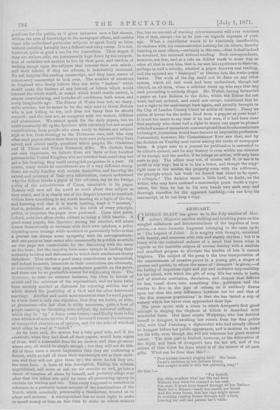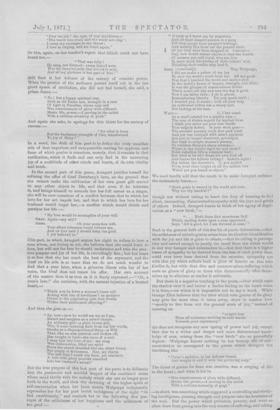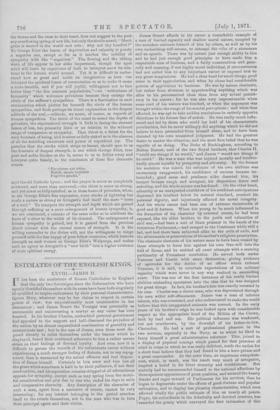ARMGART.
GEORGE ELIOT has given us in the July number of Mac- millan's Magazine another striking and touching poem on the mingled selfishness and disinterestedness of the impulses of true genius,—a semi-dramatic fragment belonging to the same cycle as 'The Legend of Jubal.' It is weighty with thought, saturated
with beauty, and sonorous with rich and stately rhythm ; but it is heavy with the restrained sadness of a mind that faces what it regards as the insoluble enigma of human destiny with a resolute and steadfast purpose to alleviate the burden of lots it cannot brighten. The subject of the poem is the true interpretation of the consciousness of creative power in a young girl, a singer of passion and genius, to whom the name of Armgart' is given,—of the feeling of imperious right and joy and exclusive responsibility for her talent, with which the gift of song fills her while it lasts, and of absolute mutilation, desolation, and despair that follows its loss, toned down into something like penitence and the resolve to live in the joys of others, as it suddenly dawns upon her that the only difference between her lot and that of the dim common populations' is that she has tasted a cup of ecstasy which has never even approached their lips.
The piece opens with a scene in which Armgart's first great triumph in singing the Orpheus of Gliick is described with wonderful force. Iler lame cousin Walpurga, who has devoted herself to Armgart, is awaiting her return from her first public trial, with Graf Dornberg, a diplomatist who had already offered to Armgart before her public appearance, and is anxious to make her his wife, even though she will not renounce her great musical career. The first part is limited, however, to the delineation of the depth and force of Armgart's love for her art, and of the nature of that thirst for fame which is of the essence of all such gifts. What can be finer than this 3—
" Poor human-hearted singing-bird! She bears Caesar's ambition in her delicate breast,
And nought to still it with but quivering song!"
Or this 7—
"For herself, Sho often wonders what her life had boon Without that voice for channel to her soul.
She says, it must have leaped through all her limbs—
Made her a Maenad—made her snatch her brand And firo some forest, that her rage might mount In crashing roaring flames through bait a land, Leaving her still and patient for a while.
' Poor wretch!' she says, of any murderess—
'The world was cruel, and she could not sing ': . I carry my revenges in my throat ; I love in singing, and am loved again."
Or this, again, on her teacher's regret that Gina could not have heard her,—
"That was folly !
Ile sang, not listened: every linki31 note Was his immortal pulse that stirred in mine, And all my gladness is but part of him !"
Still finer is her defence of the ecstasy of creative power. When the passion of the audience poured itself out in the last great spasm of exultation, she did not feel herself, she said, a prima donna :—
" NO but a happy spiritual star, Such as old Dante saw, wrought in a rose Of light in Paradise, whose only self Was consciousness of glory wide-diffused, Music, life, power,—I moving in the midst With a sublime necessity of good."
And again she asks, in apology for this thirst for the ecstasy of
success :—
" for what is fame But the benignant strength of One, transformed To joy of Many ? "
In a word, the drift of this part is to define the truly unselfish side of that imperious and unappeasable craving for applause and fame of which genius is conscious, namely, that it consists in that verification, which it finds and can only find in the answering joy of a multitude of otker minds and hearts, of its own vitality and truth.
In the second part of this poem, Armgart justifies herself for refusing the offer of Graf Dornberg's love, on the ground that she cannot make the cultivation of her own great gift second to any other object in life, and that even if he tolerates it, and brings himself to concede her her full career as a singer, she will be ever conscious of a conflict between that to which her love for her art impels her, and that to which her love for her husband would impel her,—a conflict which would divide and paralyze her life :—
" My love would bo accomplice of your will. GRAS. Again—my will?
Oh your unspoken will. Your silent tolerance would torture me, And on that reek I should deny the good I yet believed in."
This part, in which Armgart argues her right to refuse to love a
man whom, not loving as yet, she believes that she could learn to love, but will not for fear he should undermine and ruin the crea-
tive purpose and joy of her life, is exceedingly fine ; but her heart is so free that she has much the best of the argument, and the Graf on his side is so tame that we do not much wonder to find that a year later, when a grievous illness robs her of her voice, the Graf does not renew his offer. Tier own account of the matter then is as true as it is finely expressed;'---" Oh, a man's love I" she exclaims, with the natural injustice of a bruised heart,—
a Think you he loves a woman's inner self Aching with loss of loveliness ? as mothers Cleave to the palpitating pain that dwells Within their misformed offspring?"
And then she goes on :— "Ay, new—new ho would soo me as I am, Russet and songless as a missal-thrush. An ordinary girl—a plain brown girl, Who, if same meaning flash from out her words, Shucks as a disproportioned thing—a Will That, like an arm astretch and broken off, Has nought to burl—the torso of a soul. I sung him into love of me : my song Was conSeeration, lifted me apart
From the crowd chiselled like me, sister forms, But empty of divineness. Nay, my charm Was half that 1 could win fame, yet renounce A wife with glory possible absorbed Into her husband's actual."
But the true purpose of this last part of the poem is to delineate first the passionate and suicidal despair of the mutilated artist whose mind thrills with the melody which she can no longer pour forth to the world, and then the dawning of the higher spirit of self-renunciation when her lame cousin Walpurga indignantly reproaches her for her past lavish indulgence of the right " to feel exorbitantly," and reminds her in the following fine pas- sages of the selfishness of her happiness and the selfishness of her grief :— 411
0 such as I know joy by negatives, And all their deepest passion is a pang Till they accept their pauper's heritage, And meekly live from out the general store
Of joy they were born stripped of. I accept—
Nay, now would sooner choose it than the wealth Of natures you call royal, who can live In more mock knowledge of their follows' woo, Thinking their smiles may heal it.
(tremulously). Nay, Walpurga, I did not make a palace of my joy
To shut the world's truth from um. All my good Was that I touched the world and made a part In the world's dower of beauty, strength, and bliss ; It was the glimpse of consciousness divine Which pours out day and sees the day is good.
Now I tun fallen dark ; I sit iu gloom,
Remembering bitterly. Yet you speak truth ; I wearied you, it seems ; took all your help As cushioned nobles use a weary serf, Not looking at his Lam
0, I but stand As a small symbol for a mighty sum—
The sum of claims unpaid for myriad lives I think you never set your loss beside
That mighty defleit. Is your work gene—
The prouder queenly work that paid itself And yet was overpaid with men's applause Are you no longer chartered, privileged, But sunk to simple woman's penury,
To ruthless Nature's chary average— Where is the rebel's right for you alone ?
Noble rebellion lifts a common load ;
But what is he who flings his own load off And leaves his follows toiling? Rebel's right !
Say rather, the deserter's. 0, you smiled From your clear height on all the million lots Which yet you brand as abject."
We need hardly add that the result is to make Armgart embrace the melancholy lesson,—
"Much grain is wasted in the world and rots ; Why not thy handful?"
though not without taking to heart the duty of learning to feel silent, unexacting, disinterested sympathy with the joys and griefs of others. Indeed, Armgart learns to think of her agony of depri- vation as a " new birth,"-
". . . Birth from that monstrous Self Which, smiling down upon a race oppressed, Says, All is good, for I am throned ut ease.'"
Such is the general drift of this fine bit of poetic delineation,—that the selfishness of artistic genius arises from its absolute identification with the joy and life it gives to others,—that its calling is peremp- tory and sacred enough to justify the recoil from ties which would in any way hamper and overshadow it,—but that there is a higher. lesson of sympathy to be derived from the loss of such power than could ever have been derived from its exercise, sympathy not with that joy which reflects back a glow of honour on him who kindles it, but with that dim and common-place suffering which casts no gleam of glory on those who disinterestedly offer them- selves up to alleviate or render it endurable.
But there is a negative teaching in the poem,—that which casts the shadow over it and leaves a leaden feeling on the heart when it is done,—on which it is impossible not to say a word. While George Eliot believes that the blow which robs genius of its glory may give fur more than it takes away, since it teaches how "meekly to live from out the general store of joy," instead of insisting on
"nought less Than all existence working in sure tracks Towards your supremacy."
she does not recognize any new spring of power and joy, except that due to a wider and deeper and more disinterested know- ledge of man, arising from the "new birth" she so powerfully, depicts. Walpurga knows nothing in her homely life of self- renunciation to correspond to the power which Armgart felt throbbing like Cissar's ambition in her delicate breast,
And nought to still it with but quivering song."
The thirst of genius for fame was creative, was a surging of life in the heart ; and what it led to
" Was consciousness of glory wide-diffused, Music, life, power,—I moving in the midst With a sublime necessity of gockd,"
—in short, was something which suggested a controlling and vivify- ing intelligence, pouring strength and purpose into the foautains of the soul. But the power which privation, poverty, and want so often draw from gazing into the very essence of suffering, and taking
II
the thorns and the cross to their heart, does not suggest to the poet any overflowing spring of new life, but only the sterile moral, "Much grain is wasted in the world and rots ; why not thy handful ?" To George Eliot the lesson of deprivation and calamity is purely a negative one, except so far as it teaches the nobility of sympathy with like " negatives." The flowing and the ebbing wave of life appear to her alike impersonal, though the open mind will learn by experience of both to interpret anew its rela- tions to the human world around. Yet it is difficult to under- stand how so great and noble an imagination as hers can interpret the spiritual lesson of renunciation so as to make it mean a mere humble, and if you will joyful, willingness not to fare better than "the dim common populations,"—au enthusiasm of humanity' which welcomes privations because they enlarge the circle of the sufferer's sympathies. There is a fascination in such renunciation which pierces far beneath the circle of the human sympathies, and finds perhaps its truest explanation in the deepest solitude of the soul,—solitude, we mean, of course, as regards all human sympathies. The thirst of the mind to sound the depths of privation, the supernatural strength it finds in facing the sternest lesson of loss, has primarily little or no relation to the widened range of compassion or sympathy. That thirst is a thirst for the very fountain of being, and is never so fully slaked as in the absence of all the bubbling sweetness and power of superficial joy. The paradox that the stroke which strips us barest, should open to us the fountain of deepest strength, is one which George Eliot, true poet and noble thinker as she is, seems to us to fritter away and interpret quite falsely, in the conclusion of these fine dramatic scenes.
"Fac otorne nee eitiro,
Mundi, carnis faotidire
Fugitiva gaudia," says the old Catholic hymn ; and the prayer is never so completely answered, and more than answered,—the thirst is never so strong, and yet never so fully satisfied, as in those hours of privation, when, to use George Eliot's fine expression, some stroke of lightning has made a nature as strong as Armgart's feel itself the mere "torso of a soul." To interpret the strength and depth which are gained through suffering as a mere enlargement of human sympathy, is, we are convinced, a mistake of the same order as to attribute the force of a river to the width of its channel. The enlargement of human sympathy is gained, but it is gained from the previous -direct contact with the eternal source of strength. It is the willing surrender to the divine will, not the willingness to range yourself with the less happy of your fellow-creatures, which bestows Strength on such women as George Eliot's Walpurga, and makes such an agony as Armgart's a "new birth" into a higher existence of more spiritual energy,




































 Previous page
Previous page